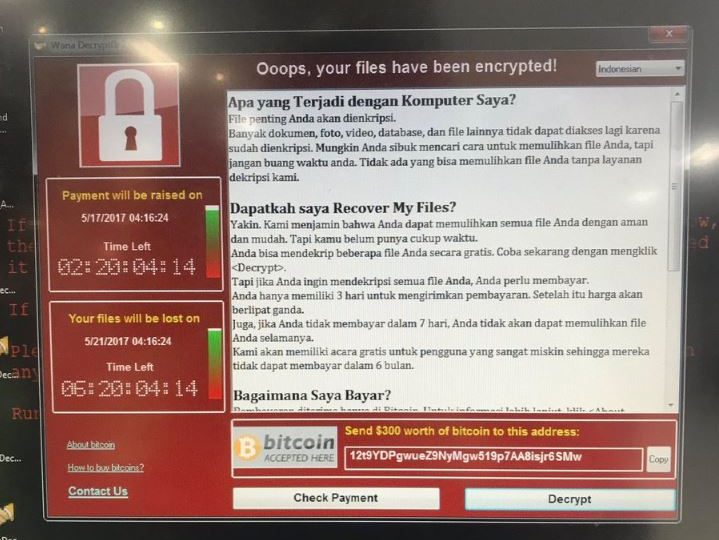At least two of Indonesia’s major hospitals have been struck in the “ransomware” cyberattack that infected computers globally, a government official said on Saturday.
Dharmais Hospital and Harapan Kita Hospital in Jakarta are affected by the ransomware, said Semuel Pangerapan, a director general at Indonesia’s Communication and Information Ministry.
“Efforts to localize the infected server are underway to prevent (the ransomware) from spreading,” he said, adding that his ministry was working with other authorities, including the Health Ministry, to solve the problem.
Cyber extortionists tricked victims into opening malicious malware attachments to spam emails that appeared to contain invoices, job offers, security warnings and other legitimate files.
@kemkominfo @KemenkesRI lokasi di RS Dharmais, mohon direspon pic.twitter.com/QJahKBOSFf
— Ilham Negara (@ilhamnegara) May 13, 2017
The ransomware encrypted data on the computers, demanding payments of $300 to $600 to restore access.
The attack, which leverages hacking tools believed to have been developed by the U.S. National Security Agency, has infected tens of thousands of computers in nearly 100 countries.
“This is so cruel,” said Abdul Kadir, president-director of Dharmais Hospital.
Nearly all computers across the hospital are affected, Kadir told Reuters, locking up its information technology (IT) system and with it patient medication records and billing.
The hospital is currently re-installing its system on backup computers and servers, he said, adding that he expects operational delays as the hospital currently operates without IT.
Globally, hospitals, companies, and universities have been affected, with the most disruptive attacks reported in Britain, where hospitals and clinics were forced to turn away patients after losing access to computers on Friday.
Indonesia’s communications ministry advised computer users to back up their data and update their security before connecting to the internet.
(Reporting by Fransiska Nangoy and Agustinus Da Costa; Editing by Eric Meijer)





Psymon says
“Cyber extortionists tricked victims into opening malicious malware attachments to spam emails that appeared to contain invoices, job offers, security warnings and other legitimate files.”
no they didn’t. so some research!